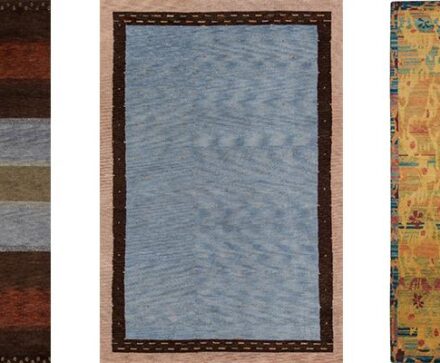Basement Rugs: Tips You Should Know

In a large open space, like a finished basement, rugs give homeowners the opportunity to create a unique living space. Sam Presnell from The Rug Gallery discusses how to ensure the rug is stain-proof, and what to do if water gets into the basement. Listen or read more to find out about basement rugs.
LISTEN NOW
John Maher: Welcome to The Rug Gallery with Sam Presnell. The Rug Gallery is an Oriental rug company and carpet store in Cincinnati, Ohio. I’m John Maher, and I’m here with the owner of The Rug Gallery, Sam Presnell. Hi, Sam.
Sam Presnell: Hey, John.
John: Sam, today we’re talking about finished basement rugs. Can a rug be used to define and maybe add some color to a finished basement?
Sam: Yes, that’s why rugs are really popular in that space because a lot of times it’s a big, wide open space, usually most of the time I’d say almost the size of the entire upstairs in some cases. You usually see it’s broken into a couple of different areas. There may be a pool table or a game area. You may have a TV with an Xbox or whatever. In one section of it, you may have a little table and chair for eating or having some drinks or a bar.
Basement Area Rugs Help Define a Space
A basement is usually a big, wide open space, and that’s where area rugs really do their work. They really pull spaces together, make them more intimate, and give you a little more of what I call a focus point.
John: Okay, like you said defining the spaces. If you have a couple of different areas, maybe like you said a TV area and a pool table area or something like that, you can define those spaces with a rug.
Sam: Yes. It really makes it warmer, inviting, gives more comfort and quiet. There’s lot things that rugs can do for you, but basically it can add that color and design that really makes a difference in a room.
Can I use an Oriental rug in a basement?
John: Are there any reasons why you might not want to use an Oriental rug in a finished basement?
Sam: I can’t think of anything other than if you’ve got issues with your basement where you’ve got water issues or backups. That would be something you would know before you finish your basement I would hope, and cure those issues which were going on there.
I would say most people don’t usually have that issue unless there’s some serious event that happens, storm-wise something like that, or sewer-wise that sometimes ruin all that good planning and all that work. I would say 90% of the time, yes, a rug would be great for basement and a good thing to use. It gives definition to that particular space.
Protecting a Rug from Water
John: Right. I suppose with a rug, too, there might be even some advantage to that, where if you did know that you were having some big storm or you were going to get some water in the basement, you could always roll those rugs up and bring them upstairs, whereas a wall-to-wall carpet [would] be awfully difficult to do that.
Sam: Yes, you’re exactly right. You definitely want to do that. Roll it up. Today, there are some really high-cost luxury performance flooring which is basically a flooring that’s waterproof, pet proof, life proof, and snaps together and floats so it can handle the water. Then the rug you could just take up and roll up, and just get [it] off the floor basically.
You don’t have to get very far off the floor. Just put it on a block with a piece of board, just sit on there, and get it a foot off the ground, you’re probably okay for most water issues. Yes, it’s perfect for exactly doing that. Taking it up, rotating it, put it somewhere else until that situation changes.
John: What can be done to protect a high-quality rug that’s being used in a finished basement?
Sam: There are different treatments that we call fabric treatments that we do which basically—as a floor carpet—you just spray it basically… it absorbs to the tips of the yarns and allows it not to absorb. I’m not saying that’s like put a piece of glass over the top of the carpet, but it really does help things lying on the surface more and would be repellent to absorbing.
Cut down on moisture
John: Like you said, obviously, if you’re going to finish your basement, you’re going to want to take care of any water issues and moisture and things like that, having dehumidifiers in your basement and things like that to make sure that you’re not—that you’re cutting down on any of that moisture that you might have. That’s a good idea for a finished basement. Anyway, but of course, it would help with the rug to make sure it’s not absorbing any moisture.
Sam: Yes. If you know moisture—as long as you have moisture anywhere, you can have mold and mildew. It’s very, very important that you conquer those things as far as moisture goes. Rugs can catch mold or mildew as well, so you want to definitely, like I said, keep that area as dry as you can, in that area.
John: All right. That’s great advice. Sam, thanks again for speaking with me today.
Sam: All right. John, my pleasure.
John: For more information about Sam, The Rug Gallery, and Oriental rugs and carpets, visit [theruggallery.com] That’s rug gallery C-I-N-C-Y.com. Or call 513-793-9505. Make sure you catch the latest episodes by subscribing to this podcast on iTunes. If you could take the time to give us a review as well, we’d appreciate that.
I’m John Maher. See you next time on The Rug Gallery.


